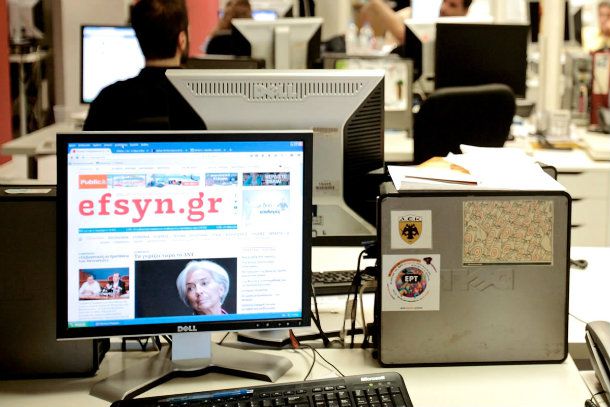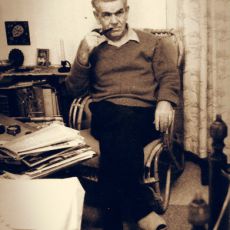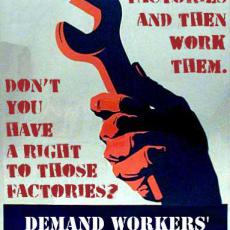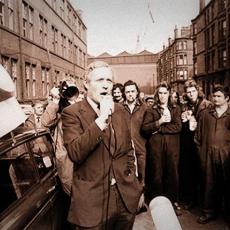The leading Greek newspaper that is run by its workers
At the 'Journalists’ Newspaper', set up after 'Eleftherotypia' went bankrupt, all 150 media workers are paid the same, the editor works for free and circulation is soaring.
At the Journalists’ Newspaper in Athens, everyone is paid the same, from the receptionist to the senior reporters, except the editor-in-chief. He works for free and lives off his pension. They don’t argue about salaries because they are also the owners of the paper, which is run as a co-operative, so everyone knows how tight finances are. In return, they get to thrash out front page stories, editorial positions and headlines without even the shadow of interference by a media baron chasing political or financial interest.
“This is pure journalism, what we do here,” said international editor Giorgos Tsiaras, who accepted a pay cut of around two-thirds to join the paper from a senior job at a rival title, but says he has no regrets.
“I’m happy to be here, being tortured every day by the likes of these guys,” he says, pointing at his team, who chose him as their leader. “It’s freedom beyond our dreams, and 150 people are living off this. We made our own jobs, this is the paradigm, the example.”
The paper was born from the ashes of a respected leftwing paper that went bankrupt near the beginning of Greece’s economic crisis. It began as an experiment that few believed could last, but it has carved out a slot as one the most respected and popular papers in the country, picking up thousands of readers in the turmoil of recent weeks, during which Greece’s government lurched away from harsh bailout terms only to controversially embrace them again in order to keep the country in the euro.
On the day the Guardian visited, official circulation figures for Efimerida ton Syntakton, the paper’s Greek name, were up two-thirds on a year earlier. Even as the country prepares for another period of swingeing austerity, it seems reliable information is something worth paying for.
“We began with the very big idea that we would help Greece overcome the crisis,” says editor-in-chief Nicholas Voulelis, whose impressive career includes a spell as a political prisoner of Greece’s military junta over 40 years ago.
“Now, after nearly three years, when other papers have seen their circulation fall, we have been gaining readers,” he says. “Part of the reason is the loss of credibility of the big papers.”
Eleftherotypia, meaning “freedom of the press”, collapsed in 2012, after a slow, painful decline. As closure drew nearer, some of the team began looking round a sector already crippled by job losses and widely loathed for partisan reporting. Driven by a mixture of pragmatism and ideology, they dared to ask if they could put together a paper themselves, and about 100 pitched in loans, savings or their working hours to create a tiny starting capital.
“We had no investors. We did it alone, believing in our power and collective abilities,” said Afrodite Tziantzi, a social affairs correspondent. “There was a readership of people fed up with the media coverage.”
It was a time when popular slogans at demonstrations included chants condemning “thugs, ruffians, journalists!”, she adds.
Wages at the paper are modest for professionals; staff members take home around €800 a month, and at first the co-operative sometimes wasn’t able to pay anything. But that is still far better than a year of meagre unemployment benefits followed by nothing at all – the situation of many Greeks at the moment – and comes with a good deal of job satisfaction. “There were times, especially in the first year, when it didn’t seem good, we had to go without wages. It could still happen now if the crisis goes on,” said Tsiaras.
But those challenges have only made their recent triumph sweeter. “It’s one of the very, very few success stories in Greece at the moment,” he says. “In media and politically it is everything I have dreamed of – to have no bosses.”
Senior journalists used to managing teams elsewhere seem to have adapted as easily to the change in style as they have to the cuts in income. “We argue a lot, we love each other a lot,” says political editor Aliki Matsi Williams, who like all the managers was chosen by her team.
“There is a debate about everything and that is good, there is no businessman behind us, no boss to oblige you to write anything, so the debate is much more original,” says Matsi, a veteran political reporter for Greek newspapers and the international news agency Reuters. “It was magic to create our own paper, to see it established in the market and earning a huge amount of respect.”
In a sign of their robust confidence, the team are also happy to discuss some of the strains of running a co-operative, including rumbles of discontent at the flat pay scale. Some increasingly resent an equal division of pay when they put in longer or more difficult days. “Of course it is not a paradise,” says Voulelis. “Because it is a co-operative, everyone feels and thinks he is a co-owner, so I can’t just say to someone ‘why are you two hours late’.”
Still, almost no one at the co-operative says they can imagine working elsewhere. “I enjoy every single second of it,” said says Giorgos Droukas, who at 21, is the youngest member by more than a decade. A recent journalism school graduate, he was so disillusioned by the country’s media that he planned to look for other work in another sector until he landed his current job. “This is real press freedom,” he said. “Without a doubt its the only paper I would work for.”






Comments
Post new comment